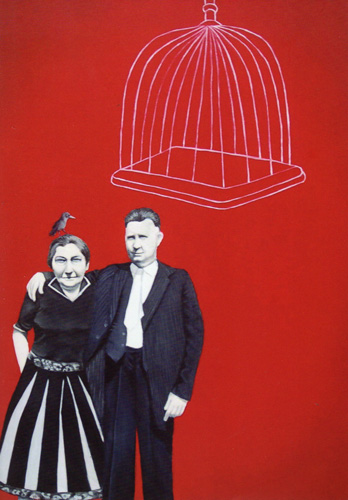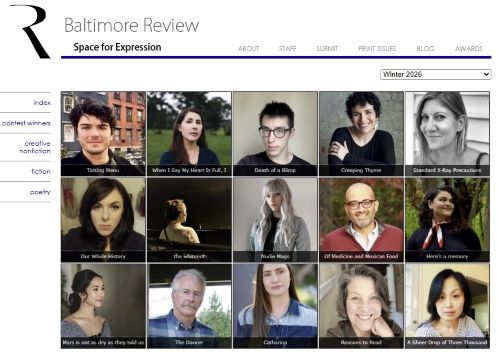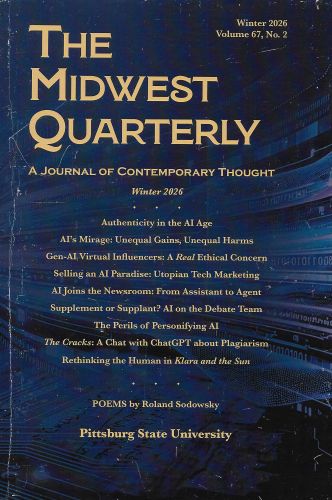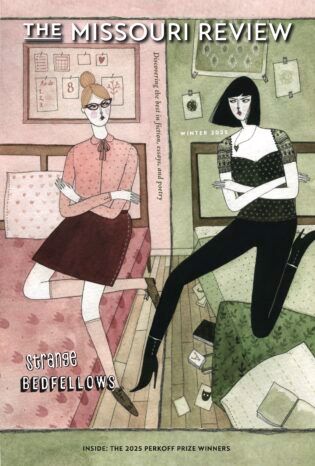Quite notable in the 35th issue of Passages North is a section called Hybrid Essays that pushes creative nonfiction to daring forms of inventiveness and complexity. Nicole Stellon O’Donnell’s hyper-short, personal pieces are exercises in compression, gleaming with economy and calculation; each less than a page long, one might mistake them for flash-fiction pieces, such as “In Gratitude to the Dream Sequence,” which meditates on power in the confines of the bedroom against power in the confines of the boardroom: “Afterward, be glad because she will not turn into your boss and tell you you’re fired.” Quite notable in the 35th issue of Passages North is a section called Hybrid Essays that pushes creative nonfiction to daring forms of inventiveness and complexity. Nicole Stellon O’Donnell’s hyper-short, personal pieces are exercises in compression, gleaming with economy and calculation; each less than a page long, one might mistake them for flash-fiction pieces, such as “In Gratitude to the Dream Sequence,” which meditates on power in the confines of the bedroom against power in the confines of the boardroom: “Afterward, be glad because she will not turn into your boss and tell you you’re fired.” One of the longer pieces from the seven authors in this section is Ming Holden’s “Noah’s Tsunami”, which reflects on transcultural experience, meteorology, pop-culture, and geology that results in something akin to mantra, lamentation or prayer:
How is it that I am here, dry.
Alive.
How is it that we can be
Righteous in this
I kept looking at the clouds that week, stretched flat and predictive of nothing.
They were unreadable, harbored no shape.
The sentiment is timely, indeed. Our sense of mortality, these days, is heightened before information technologies that help navigate survival tactics and strategies, including highly imagined scenarios from Hollywood that shock, challenge and acclimate our fears and indifference of future disasters and catastrophes—natural or man-made—evolving quietly in our midst. We’re too wired—especially in the public sphere of social media—as recipients and donors of information, solicited, unsolicited, or otherwise.
In fact, that creature in us reveals itself in this issue through Pablo Piñero Stillman whose nonfiction piece recalls blackout poetry or poetry ‘found’ in an existing text, such as newspaper articles. And it’s curious why Stillman’s piece does not belong to the hybrid essay section, because of its unconventional composition: it gathers postings from Twitter, and arranges them into essay form. It has the most mundane of titles however appropriate it sounds: “Mirror: A Found Essay from the Twitterverse”; but examined closely, pieces like these have unique layers, since each line comes from a particular mind and background, a mood in real-time, before being snatched for a rigorous process of migration and assimilation into a new, albeit familiar, context. Here, the context is about facing our faces: “Do you ever just touch your face and you’re like wow i can feel the ugly? i want to rip off my skin it might make an improvement on my face.” One wonders how much time is involved in finding the posts that Stillmann had appropriated, which raises authorship and intellectual property issues in social media.
The fiction section, in this issue, is outstanding as well, although two pieces about family appear to stand out for this reviewer. Lindsey Wolkin’s “What I’m Asking” is about a bus driver—Severance—whose sense of patriotism takes center-stage in Civil War re-enactments, events that take nostalgia to new heights, in which “[t]he novelty of a small Civil War battle in the middle of Arizona is no longer enough to attract tourists and fill restaurants” but become arenas of applause “that carry the battle even further away from what really happened like some fuel driven ride.” Part of Sev’s fuel is a girlfriend named Doreen and, too, the local bar, especially after it closes, and his mind indulges itself in the character he plays in those Civil War re-enactments—2nd Lieutenant Jimmy Barrett—who starts talking to him like some long lost buddy: “I’m a show you somethin’.” Where the story becomes poignant are in those moments when Sev visits his mother in The Silver Palms Assisted Living Center, and Wolkin takes us into where family matters bite and hurt most: “I hit you on the head and you cried a little, but I held you until you stopped. Then I hugged you tight because you looked so much like your father.”
Joe Sacksteder also examines a mother-son relationship in “Earshot—Grope—Cessation,” winner of the 2013 Great Lakes Commonwealth of Letters Fiction Contest; a high school senior named Josh Danfoss loses control of his father’s Audi “and was knocked unconscious before the car stopped rolling and started burning.” In his roadside memorial, near where the skid marks are still visible, Josh’s mother Beth leaves behind his copy of Klavierstücke, the Brahms intermezzo he never finished learning. Beth is already forty-eight, when she started taking piano lessons; six months later Josh starts taking piano lessons himself, but quits after sensing that his mother is progressing more than him. One wonders if this muted, evolving tension plays a role in the accident. The story is written from the perspective of Beth, employs a style that tries to capture the accident in her memory, and repeats the phrase “Josh Danfoss lost control” a few times, as though she herself is on the verge of being in an accident. Contest winners of the Thomas J. Hruska Memorial Nonfiction prize and Elinor Benedict Poetry prize are featured in this issue as well.
But an annual journal such as this is not without gleaming skies of poetry, which, in this issue, features a roundtable of twenty-one poets, including Bob Hikok, Kwame Dawes, Ocean Vuong, and Lindsey Tigue. Ever invested in the savoifaire and candor of the erotic, Vuong’s “Devotion” is not for those with denture ailments and issues: “And there’s nothing / more holy than holding / a man’s heartbeat between / your teeth—sharpened / with want.” In Tigue’s “Convergent Bodies”, want is like a geological event: “[i]sostatic sinking [ . . . ] caused by heavy weight”; it is about the weight of love and desire on another: “I keep / wanting my own sinking, your reckless weight / above me.” Indeed, converge and sharpen yourself in this issue of Passages North, abandon your compass, and be where there are “mirrors and windows and worlds to get lost and found in.”
[www.passagesnorth.com]





